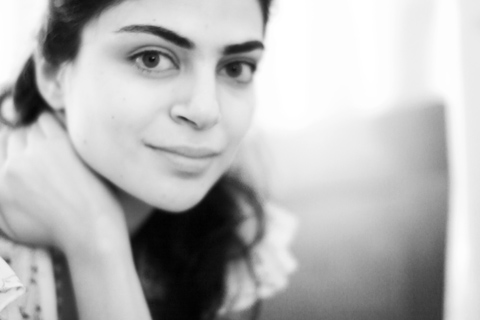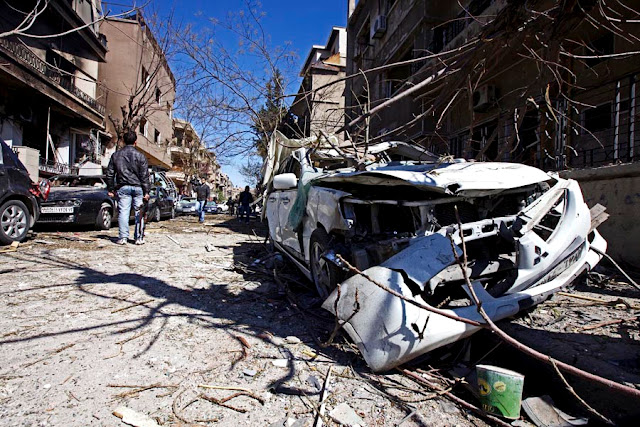Written by Adam Niemi
Photos by Carole Alfarah
A photojournalist in Syria found my blog through Twitter. When I noticed that she lives in Damascus, the country's capital, I was interested in her perspective on a country relentlessly throttled by violence in the last year.
 |
| Carole Alfarah. |
Alfarah's work has been published internationally in newspapers including the Wall Street Journal and magazines including Syria Today Magazine, Newsweek and Time. She has published photo essays online, both of the violence around Damascus and the everyday life.
The uprising in Syria is important for two reasons.
First, the Syrian uprising today is, in some essence, the early history of the United States. The people of Syria are fighting to liberate themselves from a government that has grown oppressive and tyrannical. This isn't just exclusive to U.S. history — it's a piece of history common in the births of many countries.
Second, Syria is another Middle East country in the last year that has been part of the Arab Spring, a wave of uprising in a region that for so long was passive to violent and destructive governments. The opposition of the Syrian government mirrors similar uprisings that occurred in Egypt and Libya. The political landscape in the Middle East has changed forever as a result of the events in the past year.
Alfarah said she has not processed what's happened in Syria. Sorting through the confusion is an emotional battle.
"For me, it's still early to build an opinion," Alfarah said in an email. "I know it's a year now (since the uprisings began), but the Syrian issue is very complicated and I need more time to analyze the events that surround me. I don't like the emotional answers and now all is emotional in Syria."
 |
| A young man cries during his father's funeral in Damascus, Syria. |
Alfarah describes the Syrian protestors demographic, at least in the Damascus area, as mostly college-age and expressive. Despite reports of a dwindling population in Damascus, Alfarah said the population has grown. Since attacks in Damascus are considered rare events, families have moved there from cities in turmoil like Homs, Idlib and Dara'a with hopes of living in peace.
 |
| A man shouts "Ya Allah" (Oh God) near the scene of a terrorist explosion in al-Kassa'a, a neighborhood in Damascus. |
"The majority of the café habitués here are from the enlightened Syrian class, young artists, intellectuals, bloggers and university students; and some of the 'curious-type.' This place is well known for being the summit point of Syrian activists, but basically it is more like a free-platform where they can express themselves freely."
 |
| Cars in ruins in front of a damaged housing complex in al-Kassa'a, a neighborhood in Damascus. The explosion, which occured at 7:20 a.m., killed 27 people and injured 140 more. |
Alfarah's observations in Damascus of both the pro-government and opposition civilians are a sample of what exists in the more violent regions of Syria. Alfarah said she has not witnessed any violence. Young, college-age kids -- much like the ones she finds in cafes in Damascus -- have fueled an energetic uprising that has pressured the government into invading towns and cities, squashing protests and slaughtering their own people at the mercy of their war machinery.
 |
| Blood on the sink inside a house nearby an explosion in Damascus on March 17 that killed 27 and injured 140 more. |
Alfarah shot photos at the scene of a terrorist attack in the Damascus neighborhood, al-Kassa'a, on March 17 that killed 27 people and injured 140 more. There were two explosions, the first of which came at approximately 7:20 a.m. in the Rotunda of Customs. A few minutes later, a blast occurred at Tahrir Square. It is unclear whether the attacks were religiously or politically motivated.
Alfarah, born in Damascus in 1981, has grown up with political instability in her home country. The last serious uprising came in 1982 when violent conflict with the Muslim Brotherhood convinced Hafez al-Assad to make a move. He sent troops out to kill at least 10,000 people and destroyed the old city of Hama. According to news reports, hundreds of fundamentalist leaders were jailed and many never again seen alive.
Scores of people have been murdered by the Syrian government as it worked to suppress a growing revolutionary effort. Groups either seeking prominence or showing support for the Syrian President, Bashar al-Assad, have taken part in terrorist attacks that have literally shaken Syria. Even attacks in Damascus, considered rare, have rattled any lingering feelings of peace in the capital.
The spread of Arab revolution reached Syria on March 15, 2011, when residents in Dara'a protested the torture of students who created anti-government graffiti. Since then, the effort of the revolution has been made up of factions of differences in ethnic, religious or political ideologies.
 |
| Men at al-Othman mosque during a funeral for the victims of two terrorist explosions at security centers in Damascus, Syria on March 17, 2012. |
"Everything has changed in Syria, forever. Before eleven months, Damascus seemed to be stable and far from any 'spring storms.' Now, the sense of tension and change is filling up the air."
— CAROLE ALFARAH
 |
| A damaged room of a house nearby the scene of an explosion in the Damascus neighborhood of al-Kassa'a that killed 27 and injured 140 more on March 17. |
The revolution has grown as soldiers in the Syrian military have defected and joined the opposition, mostly because they are unwilling to kill civilians. More than 9,000 people have been killed, and thousands more have displaced as a result of the fighting, according to United Nations estimates. Sunni Muslims who fled the country described the crackdown as one in which people affiliated with the Assad regime have taken arms against neighbors who oppose the government.
 |
| Vehicles damaged by the March 17 explosion in the Damascus neighborhood of al-Kassa'a. |
Resolutions proposed in United Nations meetings to sanction the Syrian government have gained little momentum after being blocked by Russia and China, Syria's traditional allies. The lack of options for international help have complicated efforts to bring the violence to a halt. In early April, the government agreed to a six-point plan for a cease-fire, Syrian troops had not returned to their barracks as promised.
The Syrian government announced on Feb. 27 that 90 percent of voters approved a new Constitution. Many Western countries dismissed the results as a farce. Some changes in the Constitution included ending political domination by the Baathist Party and implementing presidential term limits.
AMERICAN VIEWS ON SYRIA


No comments:
Post a Comment